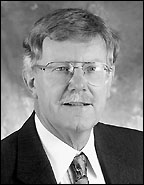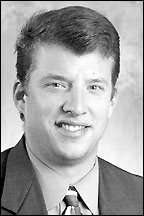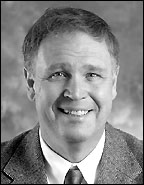Local House members preview session
This week, they share their ideas for the session, which should produce a bonding bill and will include discussions of various other issues, such as state constitutional amendments for citizens to vote on in the November elections. All members of the House (and Senate) will also face re-election in November.
Local state representatives are: Rep. Bud Heidgerken (R-Freeport), whose District 13A includes northern Kandiyohi County and western Stearns County; Rep. Larry Hosch (DFL-St. Joseph), whose District 14B includes the city of Paynesville and Paynesville Township; and Rep. Dean Urdahl (R-Grove City),whose District 18B includes all of Meeker County. All three legislators welcome comments from constituents. Local state senators will be previewed in next week's Press.
 Rep. Bud Heidgerken
Rep. Bud Heidgerken
Now in his second term as a state legislator, Rep. Bud Heidgerken (R-Freeport) has never voted in favor of a bonding bill, because he feels they cover costs for unnecessary projects while leaving important infrastructure needs unaddressed.
"A lot of pork" is included in this year's proposals, he believes, but a House proposal also allocates money to local projects for which he has been advocating. Heidgerken supports money from the sale of bonds by the state going towards wastewater infrastructures in St. Martin and Brooten, both cities in his district, and to local state parks. Gov. Tim Pawlenty has released his bonding proposal, and after both the House and the Senate approve bonding proposals, a conference committee with members of both houses of the state legislature will be formed. That committee will produce another proposal, which must pass both houses and be signed by Pawlenty before it takes effect.
Voters will voice their opinions on at least one state constitutional amendment this fall, because last year a bill was passed for an amendment that would devote all Department of Motor Vehicles sales tax revenue to transportation funding, with mass transit receiving at least 40 percent of those funds.
Heidgerken would like to see this changed to give 80 percent of the revenue to roads and 20 percent to mass transit, because he feels that country roads are in need.
A constitutional amendment defining marriage as between a man and a woman and preventing other relationships from being the legal equivalent of marriage is possible this year. Citizens should be given the chance to voice their opinions on this, Heidgerken believes.
A bill to put this on the election ballots was passed in the House last year that carries over to this second half of the two-year cycle, so the bill will move on if the Senate takes action on it.
Heidgerken, a former teacher, also serves on two education committees and has received a lot of publicity - including an appearance on Good Morning, America - for a bill he proposed that would require college professors in state schools to speak understandable English.
This, he said, is a response to the concerns of parents and of students who have had enough difficulty comprehending professors' lectures that they have struggled in classes, with some losing scholarships or spending extra semesters avoiding certain professors.
Another bill Heidgerken has been sponsoring would exempt townships from using expensive machines for township elections. Instead of the machines, which cost 10 percent of the total levy amount in some townships, he said, paper ballots could be used.
Other areas of concern for Heidgerken include increasing nursing home reimbursements in the area, equalizing education funding between metro and rural districts, and preventing mandates that needlessly constrict citizens.
 Rep. Larry Hosch
Rep. Larry Hosch
Three areas that Rep. Larry Hosch (DFL -St. Joseph) is prioritizing for inclusion in the bonding bill are the Richmond wastewater treatment, extension of the Glacial Lakes State Trail to Richmond, and funding for St. Cloud Technical College, especially for an expansion of the school's health care program.
A state constitutional amendment to make affordable health care available to all Minnesotans is something Hosch supports, but he feels that more questions about the proposal need to be answered, including what type of health care would be provided.
Hosch also foresees voters needing to make a decision on whether to amend the state constitution to dedicate a percentage of state revenue, possibly 3/16 or 1/4 of one percent, to conservation. This should be proposed as an additional tax for voters to decide on, Hosch thinks, because taking that money from the general fund may put the state back in a deficit.
Voter identification laws are being considered this session, and one proposal would require voters to bring both a photo ID as well as either a passport, birth certificate, or naturalization document when they come to vote. Since Minnesota has not had problems with voter fraud, Hosch believes this is being proposed "more for politics than for policy reasons" and is afraid of the effect such a law would have on voter turnout in the state.
As the second year of his first term gets underway, Hosch is also concerned with passing laws to make the state legislature more accountable, after last year's struggle to pass a budget and end the session on time.
Implementation of clean water standards that are required by the federal government has wide support, Hosch said, though there has been debate as to where the money should come from. The governor has proposed taking $20 million from the general fund for this purpose, and $20 million has also been included in some bonding bill proposals.
Hosch supports a bill that would double motorist fines for those citizens committing them while talking on a cell phone, because such a law would encourage drivers to pay attention to the road. He drives a lot because of his work at the capitol and likes that the proposal would not interfere with motorists beyond increasing the penalty as a deterrent to irresponsible driving.
Hosch also anticipates discussion of stadium bills from the Twins, Vikings, and Gophers and a resolution for an increased use of renewable energy in the state.
 Rep. Dean Urdahl
Rep. Dean Urdahl
Roads and bridges are in need of funding in the bonding bill, according to Rep. Dean Urdahl (R-Grove City), as well as money for conservation and habitat restoration.
He expects the House to pass a bonding bill between the governor's proposal of nearly $900 million and the Senate's proposal of just under $1 billion.
Though he does not expect a health care amendment to be put on the November ballot, Urdahl would like to see "a good plan that will contain cost of health care and provide competition," because he feels that health care funding and availability are a large problem in the state.
Clarification is necessary on the transportation funding amendment that was passed last year and will be on the ballot this year, said Urdahl. He feels that limits need to be put on the percentage of the money that will go towards roads and towards mass transit.
Urdahl is the member of two agricultural committees, and he will be working to pass an investment tax credit for dairy farmers which he proposed and which was included in the governor's budget proposal for the year. (Though the legislature passed a two-year budget last year, a supplemental budget will be done this year.)
A supporter of renewable energy, Urdahl anticipates the passing of a bill resolving to have the 25 percent of the state's energy from renewable sources by the year 2025. Other proposals suggest 20 percent renewable energy by 2020.
Immigration status checks on state driver's licenses would be appropriate, said Urdahl, who supports laws that encourage immigrants to become citizens and which aid them in that goal. He also supports stricter voter identification laws.
School safety and security are a priority for Urdahl, as well, and eminent domain is another area of concern for him. This year, the legislature does not need to finish anything but a bonding bill, but he expects to cover many issues and "hopefully go home in the middle of May" when the session is scheduled to end.
(Editor's Note: Andrie is a 2004 graduate of Paynesville Area High School and a sophomore at the University of St. Thomas in St. Paul. This is her second year of covering the legislature for the Press.)
Contact the author at editor@paynesvillepress.com • Return to News Menu
Home | Marketplace | Community